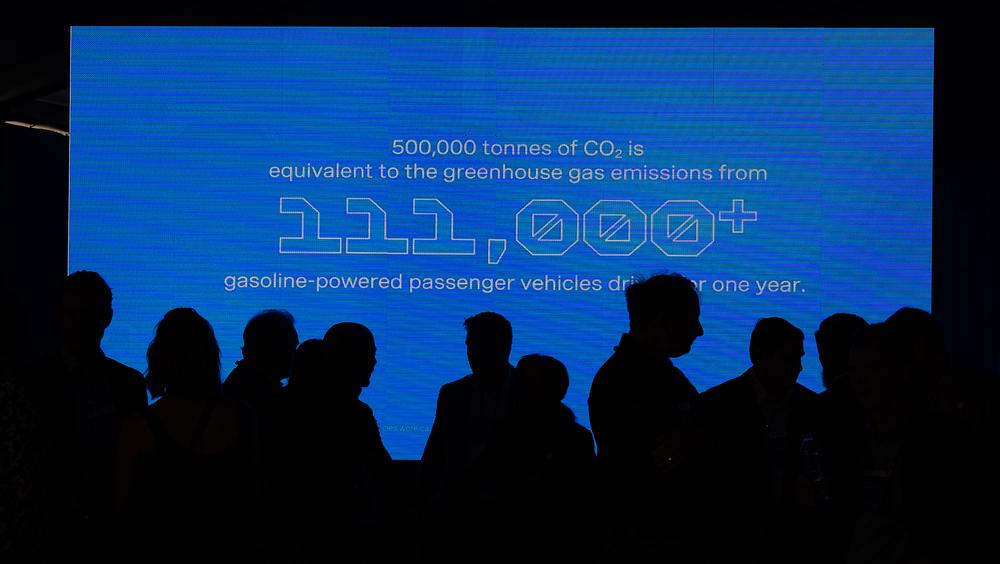The tech industry has championed the development of new technologies that filter carbon dioxide out of the air as a way to try to undo the damage caused by planet-heating emissions. Over the past several years, they’ve made a slew of splashy announcements to fund these kinds of projects, called direct air capture (DAC).
That dovetailed with the Joe Biden administration’s attempt to fight climate change by funneling federal dollars into regional hubs for DAC. Now there’s a new president in town, one who calls climate change a hoax and wants to “drill, baby, drill.” The Donald Trump administration’s latest attempts to kill clean energy and climate initiatives include slashing federal funding last week for at least 10 DAC hubs.
It comes at an inflection point for American tech companies as their obsession with AI creates more carbon pollution. And it raises questions about how much they’ll still be able to rely on carbon removal projects in the US to meet their sustainability goals as the Trump administration tries to make the country as inhospitable to climate startups as possible.
Big names including Microsoft and Amazon have already made significant commitments to carbon removal projects in the US. “I would imagine they’re going to spend that money, that they are at minimum already committed to this,” Erin Burns, executive director at the nonprofit Carbon180, which advocates for carbon removal, tells The Verge. “The question is are they going to spend it on projects that are built here in the United States? Or are they going to spend it somewhere else?”
Big names including Amazon and Microsoft have already made significant commitments to carbon removal projects
The US Department of Energy announced last week that it would terminate about $7.5 billion worth of financial awards for 223 clean energy and climate projects. A spreadsheet listing the names of grantees who lost funding, which the agency shared with lawmakers and was obtained by The Verge and other media outlets, confirms that awards for at least 10 DAC hubs were terminated.
That includes a grant that California-based startup CarbonCapture received to conduct an engineering study for a new DAC plant in Louisiana. Microsoft inked an agreement with CarbonCapture in 2023 to draw down carbon pollution as part of the tech giant’s goal of eventually becoming carbon negative.
CarbonCapture announced in Bloomberg last week that it would move its first commercial pilot project from Arizona to Alberta, Canada. That decision has been months in the making, CarbonCapture CEO Adrian Corless tells The Verge, after they started to see the writing on the wall for DAC in the US post-election. Trump’s FY2026 budget proposal released in May called for ending funding for removing carbon dioxide out of the air, calling it part of a “Green New Scam.”
When The Verge spoke with Corless late Friday, the company hadn’t yet received confirmation from the DOE that its grant had been cut beyond the spreadsheet released to some lawmakers and lobbyists. But following the news, he says, “We’re not on track any longer to do a project in Louisiana” if there’s an absence of funding. CarbonCapture was also a partner in similar DAC projects proposed in California and Illinois that had their grants terminated, as well as another project in Arizona that was not on the list to lose funding,
When it comes to funding cuts as a whole for carbon removal, he adds, “It’s clearly going to set back the US in terms of the leadership position that it earned over the last four years in this particular space.”
Microsoft was also slated to become one of the first customers for a federally funded DAC hub in Louisiana being developed by two other companies. In 2022, the Biden administration launched a $3.5 billion program to build regional direct air capture hubs across the US. Notably, some hubs that are further along in development — and also projects backed by oil and gas companies including Chevron and Occidental Petroleum (OXY) — weren’t on the list of grants the DOE decided to terminate last week.
Captured carbon can be used in a process called enhanced oil recovery to push more hard-to-reach reserves out of the ground. Earlier this year, Occidental said on an earnings call that it expected its carbon removal business to help it extract tens of billions more barrels of oil and that it had “several conversations” with the president about the “business case” for carbon removal.
Occidental subsidiary 1PointFive is developing a massive project at King Ranch that the DOE under the Biden administration also chose to fund as one of the first DAC hubs. Amazon announced a deal to purchase 250,000 metric tons of carbon removal from 1PointFive in 2023.
Smaller DAC companies, which might rely on federal funding more than a large fossil fuel company with more capital to pump into projects, now face stronger headwinds in the US. “Unless you have the capital capacity, like an Oxy, it’s going to be really hard to … you know, actually move to a stage to deploy.”
The Trump administration’s targeted attacks add to other challenges the emerging carbon removal industry still faces, like whether DAC can be affordable and sustainable at scale given how much energy the technology requires. CarbonCapture canceled another one of its projects in Wyoming last year, citing issues securing enough electricity quickly for the facility.
Meanwhile, tech companies including Microsoft, Amazon, and Google that have turned to DAC to try to reduce their carbon emissions have actually seen their carbon footprints grow in recent years despite their stated climate goals. As they build out data centers packed with more powerful and more energy-hungry hardware to support new AI tools, the conundrum they’re in gets deeper. Some environmental advocates have always been skeptical of DAC, worried that companies would bet on it as a quick fix instead of focusing on reducing their emissions in the first place.
Other climate advocates contend that humans have already created too much carbon pollution to ignore, and that carbon removal is a necessary tool for stopping climate change. And as the Trump administration rolls back one environmental protection after another — the DOE even told its employees to avoid using the term “climate change” — it looks like there’s going to be even more carbon to clean up.
The DOE’s funding cuts last week were largely seen as another partisan attack against Democrat-led states that are home to most of the projects as the congressional budget fight and resulting government shutdown continue. The House budget proposal for FY26 sought to rescind $1 billion for the DAC hubs program.
But the DOE’s cuts affect projects across red states, too, as Heatmap points out in its reporting. The canceled CarbonCapture grant is listed as a California project on the spreadsheet, even though it was supposed to be sited in Louisiana. And it wasn’t just DAC targeted. The canceled grants run the gamut, from hubs for hydrogen fuel to turbine and battery manufacturing.
It’s a blow to American innovation across all these industries, Burns says. “It’s giving up a huge advantage in the United States that we have, right? … We’re spiking the ball, I guess, not dropping it.”

 Vittori debutta con Turbio, l’hypercar ibrida firmata da Pininfarina
Vittori debutta con Turbio, l’hypercar ibrida firmata da Pininfarina